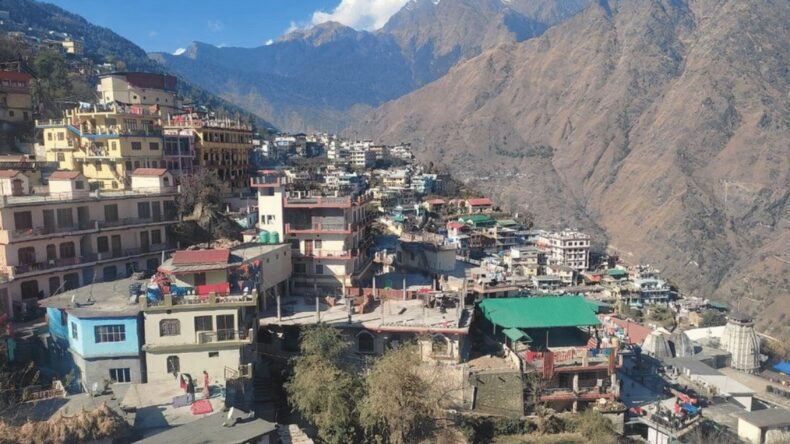While 86 homes have already been designated as “unsafe” and tagged with red “X” marks, the initial round of demolitions is concentrating on two hotels that are among Joshimath‘s worst-hit properties due to soil subsidence. One of the hotels, the Malari Inn, has tipped toward the other hotel due to extensive ground fissures that have nearly wholly severed it from its base (Hotel Mount View).

Hotel Malari Inn, Joshimath
The two hotels were surveyed on Tuesday by a team from the Central Building Research Institute (CBRI), which has been hired to handle the destruction. The proprietor of the Malari Inn and other locals staged demonstrations as the demolition work was scheduled to start in the evening, preventing the CBRI and State Disaster Response Force (SDRF) officials from accessing the hotel in Joshimath.
The team’s leader, CBRI Chief Scientist D P Kanungo, told The Indian Express that they intended to conduct a “mechanical” demolition without using explosives. Kanungo was a member of the crew that last year demolished the Supertech twin skyscrapers in Noida.

“Since the foundation of the first hotel (Malari Inn) crumbled, the harm is irreparable.” The other hotel has been damaged due to the hotel shifting its weight. For this reason, safe mechanical destruction of these two structures is required. We have explored both systems and have created a thorough strategy. Safety of nearby and below the two hotels, as well as of the employees entering the structures to carry out the destruction, are our top priorities, according to Kanungo.
He stated that the demolition would be done in stages, from top to bottom, and would likely take three to four days. First, the Hotel Malari Inn will be destroyed.
Since utilizing explosives is not an option in this location, we will use concrete cutters and other machinery to cut and remove portions of the structure. We will keep track of who enters the building and double-check that list at the end of each shift to ensure our employees are secure. He added that barricades would be erected behind the buildings to prevent falling debris from harming other structures.
According to Kanungo, his crew has yet to discover any fractures in the walls of the two structures. Thus it is safe for the workers to enter and do business inside.
When asked whether it was likely that more buildings would be torn down, Kanungo said that the government had only yet given instructions for the demolition of these two properties.

The Chamoli district administration’s most recent data shows that 723 homes have reported cracks, while 86 have been deemed hazardous thus far. Until Tuesday, 462 individuals from 131 families had been relocated to the temporary shelters.
Meanwhile, compensation in accordance with the prices specified in the Badrinath Dham redevelopment scheme has been sought by the locals, including the proprietors of the two hotels. District authorities claim that the Badrinath master plan offers double the circular rate compensation.
A representative of the district administration claimed that no formal negotiations on a compensation plan had taken place and that they had just been given the go-ahead to destroy the two hotels.
The proprietor of Malari Inn, Thakur Singh Rana (63), told The Indian Express in the morning that he had not received any notice of the destruction and had only learned of it from media reports. Even though he received a message later in the day, the payment still needs to be verified.
The hotel, which includes 28 rooms, was built in 2011, according to Rana. He asserted that he had invested 4-5 crore rupees in its building.
While everything was going on, Chamoli District Magistrate Himanshu Khurana was instructed by Uttarakhand Chief Secretary S S Sandhu to oversee evacuation efforts in the affected regions. He gave the district administration the order to tear down the worst-affected structures on a priority basis.

“All impacted homes should be moved, and hazardous structures should be demolished first as a matter of urgency, to ensure there are no fatalities”. An official release quoted him saying, “Adequate measures should be established in the temporary shelters, and there should be no communication gap between the affected people and the government.
To prevent mobile networks from being impacted, instructions have also been made to move cellular towers to secure locations. Sandhu ordered the district administration to form evaluation panels and invite locals to serve.













